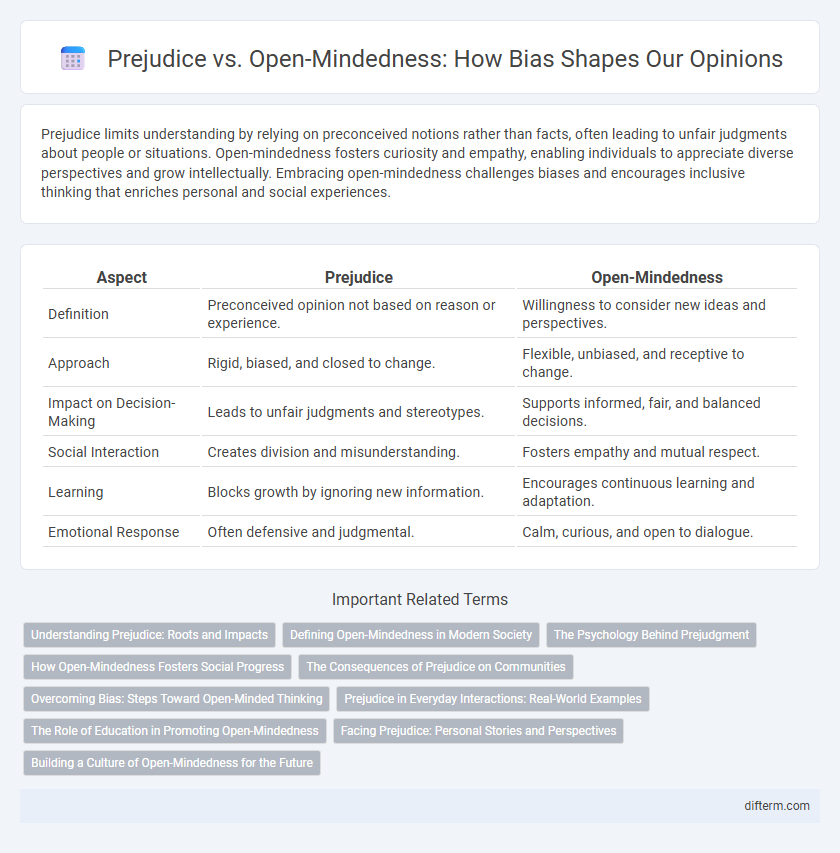Prejudice limits understanding by relying on preconceived notions rather than facts, often leading to unfair judgments about people or situations. Open-mindedness fosters curiosity and empathy, enabling individuals to appreciate diverse perspectives and grow intellectually. Embracing open-mindedness challenges biases and encourages inclusive thinking that enriches personal and social experiences.
Table of Comparison
| Aspect | Prejudice | Open-Mindedness |
|---|---|---|
| Definition | Preconceived opinion not based on reason or experience. | Willingness to consider new ideas and perspectives. |
| Approach | Rigid, biased, and closed to change. | Flexible, unbiased, and receptive to change. |
| Impact on Decision-Making | Leads to unfair judgments and stereotypes. | Supports informed, fair, and balanced decisions. |
| Social Interaction | Creates division and misunderstanding. | Fosters empathy and mutual respect. |
| Learning | Blocks growth by ignoring new information. | Encourages continuous learning and adaptation. |
| Emotional Response | Often defensive and judgmental. | Calm, curious, and open to dialogue. |
Understanding Prejudice: Roots and Impacts
Prejudice stems from deep-seated fears, cultural conditioning, and lack of exposure to diversity, leading to biased judgments and social division. Understanding the psychological roots of prejudice reveals its impact on marginalized groups, including discrimination, reduced opportunities, and mental health challenges. Promoting open-mindedness encourages empathy and critical thinking, essential for dismantling stereotypes and fostering inclusive societies.
Defining Open-Mindedness in Modern Society
Open-mindedness in modern society embodies the willingness to consider diverse perspectives, embracing complexity beyond personal biases. It involves critical thinking and empathy, allowing individuals to challenge preconceived notions and adapt to evolving cultural and social paradigms. Cultivating open-mindedness fosters inclusive dialogue and innovation, essential for navigating global interconnectedness and rapid change.
The Psychology Behind Prejudgment
Prejudgment stems from cognitive biases such as confirmation bias and in-group favoritism, which influence individuals to form opinions without sufficient evidence. These automatic mental shortcuts often reinforce stereotypes and hinder objective evaluation of others. Understanding the psychological mechanisms behind prejudgment is crucial for fostering open-mindedness and promoting bias awareness.
How Open-Mindedness Fosters Social Progress
Open-mindedness fosters social progress by encouraging diverse perspectives and innovative solutions that challenge existing prejudices. Embracing different viewpoints cultivates empathy and reduces biases, leading to more inclusive communities and equitable policies. Societies that prioritize open-mindedness experience enhanced collaboration, creativity, and resilience in addressing complex social issues.
The Consequences of Prejudice on Communities
Prejudice in communities fosters division, social inequality, and systemic discrimination, undermining social cohesion and mutual trust. It perpetuates stereotypes, limiting opportunities for marginalized groups and fueling resentment and conflict. Open-mindedness encourages inclusivity and understanding, promoting a healthier, more equitable society.
Overcoming Bias: Steps Toward Open-Minded Thinking
Overcoming bias requires conscious effort to identify and challenge personal prejudices, replacing assumptions with evidence-based understanding. Engaging with diverse perspectives and practicing empathy fosters open-minded thinking by expanding cognitive flexibility and reducing stereotyping. Regular self-reflection and education develop awareness of implicit biases, promoting inclusive attitudes and fair decision-making.
Prejudice in Everyday Interactions: Real-World Examples
Prejudice often manifests in everyday interactions through assumptions based on race, gender, or socioeconomic status, leading to unfair treatment and missed opportunities for meaningful connection. For example, workplace bias against minority candidates can hinder career advancement despite equal qualifications, perpetuating inequality. Such ingrained prejudices reinforce social divisions, making it essential to recognize and challenge these behaviors to foster inclusivity.
The Role of Education in Promoting Open-Mindedness
Education shapes cognitive frameworks by exposing individuals to diverse perspectives and critical thinking skills, which are essential in dismantling prejudice. Curricula that emphasize cultural competence and empathy foster open-mindedness, reducing biases rooted in ignorance or stereotyping. Schools and universities serve as pivotal environments where inclusive values are instilled, preparing students to engage constructively in multicultural societies.
Facing Prejudice: Personal Stories and Perspectives
Facing prejudice often reveals the profound impact of bias on individuals' lives, highlighting the urgent need for open-mindedness to foster understanding and empathy. Personal stories illustrate how preconceived notions can distort reality and perpetuate injustice, while openness encourages dialogue and bridges cultural divides. Embracing diverse perspectives challenges ingrained stereotypes and cultivates a society where fairness and respect prevail.
Building a Culture of Open-Mindedness for the Future
Cultivating a culture of open-mindedness requires actively challenging deep-seated prejudices and embracing diverse perspectives to foster empathy and innovation. Educational institutions and workplaces play a pivotal role in promoting inclusivity through dialogue and exposure to different worldviews. Prioritizing open-mindedness enhances social cohesion and prepares societies to navigate complex global challenges with flexibility and understanding.
prejudice vs open-mindedness Infographic

 difterm.com
difterm.com